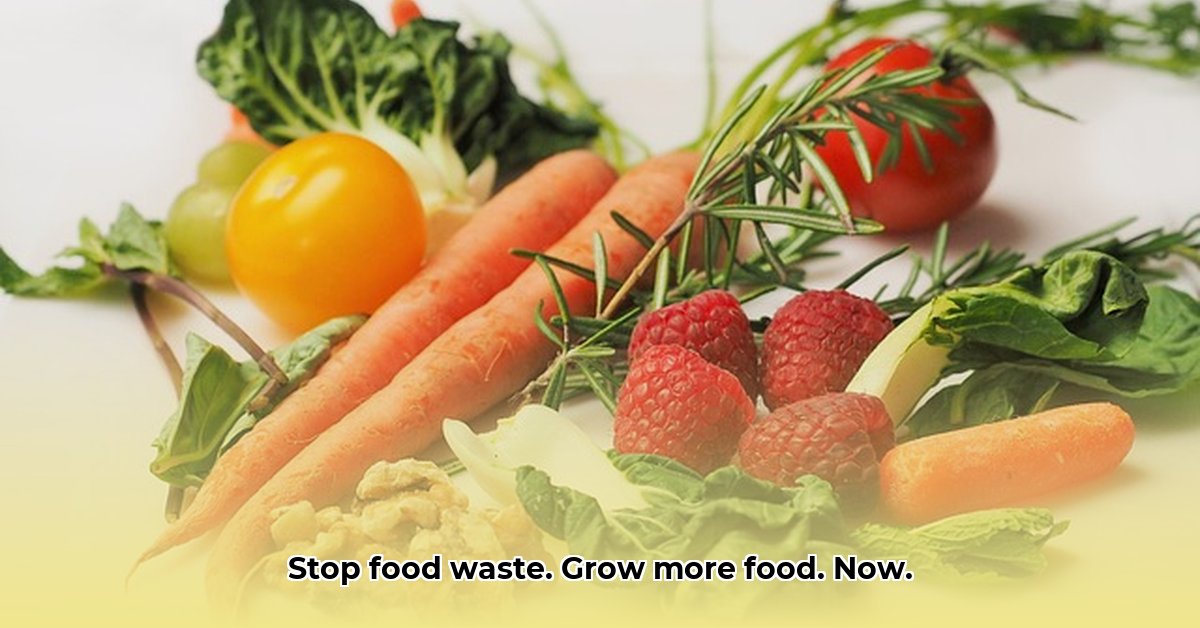
Food waste is a silent crisis, stealing from our planet and our profits. But imagine a future where farms are more productive and sustainable, saving money and protecting the environment. That's the Froodly vision: a more efficient and abundant food system for everyone.
The Shocking Truth: Wasted Food, Wasted Opportunity
Tons of perfectly good food ends up in landfills each year. It's not just about leftovers; it's the entire food journey, from farm to field to fork, that's ripe for improvement. Spoilage during transport, inefficient harvesting, and inadequate storage all contribute to massive resource depletion, greenhouse gas emissions, and significant financial losses for farmers and businesses. But what if we could recover this lost potential?
Did you know that nearly one-third of all food produced globally is wasted? This staggering statistic highlights the urgent need for change.
Froodly's Plan: A Collaborative Approach
Froodly isn't a one-size-fits-all solution; it's a comprehensive strategy engaging everyone in the food chain. It's about teamwork, and every player has a vital role.
Farmers: Growing More, Wasting Less
Farmers are on the front lines. Simple changes can yield significant results:
Smart Storage: Invest in better storage solutions – temperature-controlled rooms, airtight containers, and proper ventilation – to extend the shelf life of produce and minimize losses. Even simple improvements can reduce waste by 15-20%.
Tech-Savvy Farming: Embrace precision agriculture tools like sensors and drones to optimize planting, watering, and harvesting. Froodly can connect you with the right technology partners. Precision agriculture technologies have demonstrated yield increases of up to 20% in some studies.
Community Connections: Collaborate with local businesses to find creative uses for excess produce. This could involve supplying surplus produce to nearby bakeries or using excess as animal feed. Diversifying your product usage can increase revenue by up to 10%.
Food Processors: Efficiency and Innovation
Food processors play a crucial role:
Streamlined Systems: Optimize your production lines to minimize waste – this may involve equipment upgrades or workflow adjustments. Even small changes can make a significant impact on reducing waste by at least 5%.
Eco-Friendly Packaging: Utilize packaging that maintains freshness and is environmentally responsible. Biodegradable or compostable packaging lowers waste disposal costs.
Waste-to-Treasure: Explore options like composting or biofuel production to transform food scraps. Composting reduces landfill waste and improves soil health.
Retailers and Wholesalers: Managing Stock Intelligently
Retailers and wholesalers hold considerable power:
Real-Time Tracking: Employ technology to accurately track inventory levels, preventing overstocking and minimizing waste. Real-time inventory management can reduce waste rates by 10% to 15%.
Smart Pricing Strategies: Offer discounts or promotions on nearing-expiration produce. This encourages sales before spoilage, reducing waste and boosting revenue. Reduced-price strategies can recover 5-10% of otherwise discarded sales.
Donation Partnerships: Collaborate with local food banks or charities to donate excess goods. Food donation programs demonstrate significant community and social benefit.
Consumers: Conscious Choices, Reduced Waste
Consumers are also key players:
Meal Planning: Create shopping lists based on planned meals to avoid impulse purchases and reduce food waste. "Plan to shop, shop to plan"—this simple philosophy can significantly reduce food waste at home."
Proper Storage: Implement the "First In, First Out" (FIFO) method and clearly label products with use-by dates. Proper storage extends the shelf-life of perishable products by an average of 3-5 days.
Creative Cuisine: Repurpose leftovers into new dishes—a little creativity can transform last night's dinner into a delightful lunchtime treat. Creativity in the kitchen turns food waste into a flavorful adventure!
Sustainable Shopping: Support businesses demonstrating a commitment to reducing food waste. Supporting sustainable businesses directly contributes to a positive environmental impact.
Froodly: Connecting and Empowering
Froodly is more than a website; it's a network connecting everyone in the food system, offering support, advice, and tools. We're all in this together.
"Reducing food waste isn't just environmentally responsible; it's economically smart," says Dr. Anya Sharma, Lead Researcher at the Sustainable Agriculture Institute. "By adopting Froodly's methods, we can create a more profitable and sustainable food system for all."
A Brighter Food Future: Less Waste, More Abundance
By embracing Froodly's strategies, we can build a more sustainable, efficient, and profitable food system, while minimizing food waste. Let's work together to make it happen!